Quokkas and wallabies found dead in Australian zoo mystery
 Getty Images
Getty ImagesAn Australian zoo is investigating the sudden deaths of seven female quokkas and two yellow-footed rock-wallabies.
Why the marsupials died remains a mystery but "plant toxicity" is believed to be the most likely cause, an Adelaide Zoo spokeswoman said.
The vet team is confident it is an isolated incident but further investigation is under way, she said.
No animals from other exhibits have shown signs of being unwell since the deaths, which happened last month.
"The loss of one animal, let alone a large group in a sudden incident such as this, is extremely upsetting, particularly for those who care for them," the spokeswoman said.
An 11-month-old quokka joey survived and is recovering in the zoo's health centre. The remaining three male quokkas have been taken off the exhibit.
Other yellow-footed rock-wallabies and kangaroos were "noticeably flat" after the incident but have now recovered fully, the zoo said.
Pathology and toxicology reports have so far been inconclusive, but the zoo is carrying out more tests to discover what caused the animals to become sick.
The zoo breeds both native marsupials species, which are listed as vulnerable in the wild.
Often dubbed "the world's happiest animal", quokkas are darlings of tourist photos on social media.
But less than 15,000 remain in the wild, most on Western Australia's Rottnest Island.
Only about 2,000 yellow-footed rock wallabies are left in the wild, mostly in South Australia, estimates suggest.

